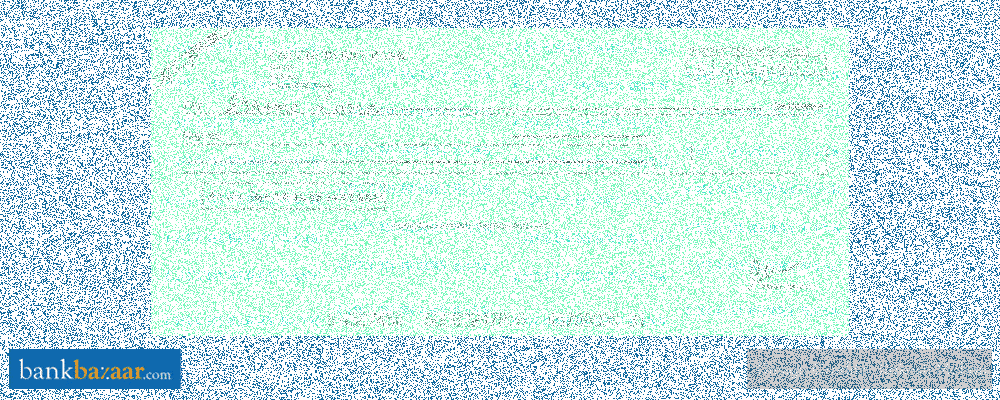
Did you know there is more to that cheque leaf you issue when making payments? We’ll tell you about the different types of cheques issued in India.
What is a cheque?
First, let’s begin with the basics. A cheque is a financial instrument issued through a bank account by an account holder to make certain payments to an individual or a company. A cheque also allows you to transfer funds from one bank account to another.
Additional Reading: Know Your Cheque
What details are necessary in a cheque?
Now, we’re going to get to the marrow and explain the anatomy of a cheque.
Drawee: All cheques must be issued by a specific bank. This is called the Drawee Bank.
Drawer: Cheques must be signed by the person who issues the cheque. This person is called the Drawer.
Payee: Cheques should have the name of the recipient mentioned on them. The recipient is called the Payee.
Amount: The amount of money given to the recipient through the cheque should be clearly mentioned. This amount needs to be given in both words and numerical figures.
Date of issue: All cheques should have a date printed on them. This is the date that a cheque is issued. Cheques are valid for a period of three months from the date mentioned on them.
Additional Reading: Beware Of Bounced Cheques!
Classification of cheques
Cheques are classified depending on location.
- Local cheques
A local cheque is one which is issued by a bank that is located in the same city as the payee or the person receiving the money.
- Outstation cheques
If a cheque issued by a bank in Chennai for example, is presented in the bank’s branch located in Bangalore, such a cheque is deemed to be an outstation cheque. Transactions on outstation cheques may attract a nominal banking fee.
- At par cheques
Cheques that are accepted at all of a bank’s branches nationwide are called at par cheques. No additional banking charges are levied to process at par cheques.
Additional Reading: What Is A Cancelled Cheque?
Cheques are also classified based on their value.
- Normal value cheques
Any cheques that have a value below Rs. 1 lakh are considered normal value cheques.
- High value cheques
Any cheques that have a value above Rs. 1 lakh are considered high value cheques.
- Gift cheques
A cheque issued for gifting money to a family member is called a gift cheque. The value of gift cheques may vary from Rs. 100 to Rs. 10,000.
There are primarily four types of cheques
- Open cheque
A cheque that is used to receive money over the counter at a bank is called an open cheque. Anyone can withdraw money using an open cheque. With an open cheque, a person can withdraw money over the counter, deposit the cheque in an account or give the cheque to someone else after affixing his signature on the reverse of the cheque.
- Bearer cheque
A bearer cheque is one that can be paid to any person who presents it at a bank counter. Unlike an open cheque, a bearer cheque does not need the endorsement on the reverse by the account holder.
- Order cheque
An order cheque is payable to a specific person. In an order cheque, the term ‘Bearer’ may be struck out and replaced by the word ‘Order’. If required, the payee can transfer an order cheque to another recipient by signing on the reverse of the cheque.
- Crossed cheque
A crossed cheque cannot be encashed over the bank counter. A crossed cheque can be realised only by crediting the recipient’s bank account with the money.
A bank will also offer different cheques which will guarantee payments.
- Self cheque
This is a cheque that is written by the account holder to get cash at the bank branch. This can be used as an alternative to a Debit Card at an ATM.
Additional Reading: How To Deal With A Faulty ATM
- Post-dated cheque
A post-dated cheque is a crossed cheque or a bearer cheque that is issued to a payee and is meant to be presented and honoured at a future date. All cheques are valid for a period of three months from the date printed on the cheque.
- Banker’s cheque
This type of cheque is issued when a bank draws money from its own funds rather than from an account holder’s funds. A banker’s cheque is issued after the bank confirms the account status of the requestor and then deducts the required amount from the account holder’s account.
Additional Reading: The Legal Consequences With Bounced Cheques
And that’s your guide to the various types of cheques issued by banks in India.
Here’s a quick video that will give you a lowdown on all the important things that you need to know about a cancelled cheque:
Use of Cancelled Cheques
But, enough talk about paying out money through cheques. Are you ready to talk about savings and investments? We can help you in that department as well!